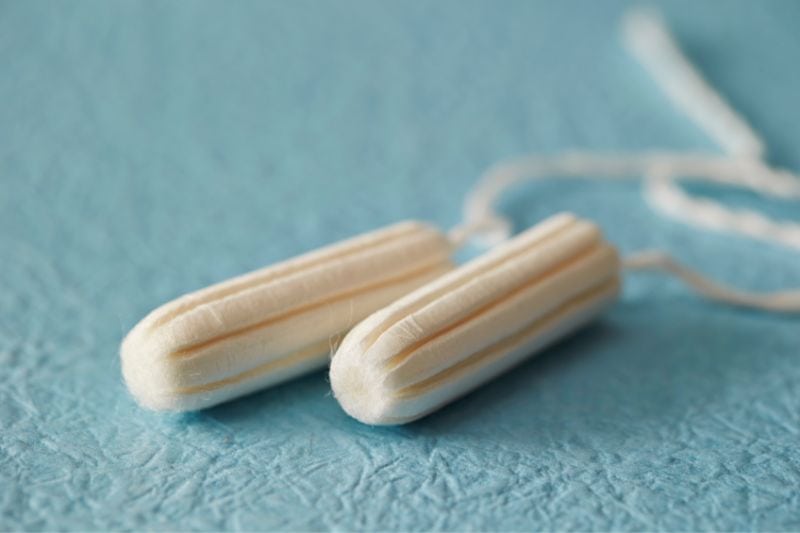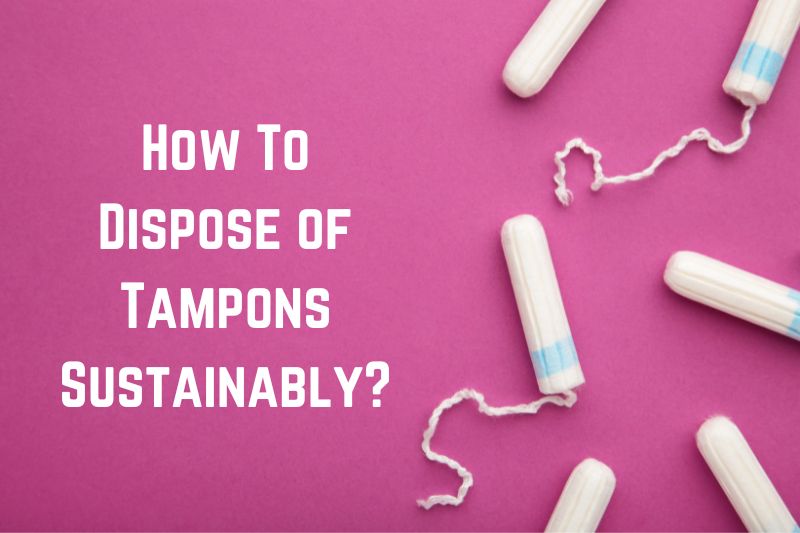To ensure comfort and prevent leaks during your period, it’s a fantastic idea to learn how to insert a tampon correctly if you’re new to using them or periods in general. However, you might need to consider how to dispose of used tampons and what happens whenever you change them.
Since tampons have so many advantages over sanitary pads, many individuals use them instead. But, if you don’t properly dispose of them after using them, they might be a major environmental problem. Let us examine the proper and sustainable way to dispose of tampons.
Read: How To Dispose of Nail Polish Sustainably? (Read on)
Various Ways To Dispose of Tampons
One way or another, you’ll need to manage your tampons. For this reason, you should be aware of the proper way to dispose of your tampons. We’ll get right on it for you, though. But this may vary depending on the kind of tampon you receive, as we have found in most cases.
That instance, whether you have an organic or ordinary tampon will determine how you should dispose of it. Now that everything is apparent let’s start with secure methods for getting rid of your organic tampons.
Composting
If disposed of properly, tampons can be composted! There is no reason why you can’t compost natural menstruation products in addition to old cotton along with other natural clothing. Menstrual blood contains iron, calcium, phosphate, and sodium, making it a great natural fertilizer for various plants!
However, more caution is required since used tampons contain past menstrual blood. If you possess a traditional bin, the ideal use for your compost is to restore deficient soils and grow plants instead of growing food.
Naturally, menstrual fluids are harmless but can pose a health risk! But if you let it sit in a sealed container for an adequate amount of time, the contents will eventually break down into usable compost.
Donate or Give Out
Donating unwanted, unopened tampons to homeless shelters or groups that give period goods to the underprivileged is a good way to decrease waste. Menstrual product sharing can be a long-term, sustainable approach to support others.
Bin It
You can always throw away your tampon. But keep in mind that there is a proper method for doing this. All you have to do is make sure they are sealed. For this, a biodegradable bag will work well. After that, you can get rid of them in the trash can. Always make sure to use the trash can.
Incineration
While it’s not a popular way to get rid of waste on an individual basis, certain areas have commercial facilities that burn sanitary waste in high-temperature incinerators. This method may manage tampon disposal sustainably because it produces less trash.

Is It OK To Flush Tampons Down the Toilet?
Tampons should never be flushed! Tampons might clog pipes because they do not decompose quickly enough after flushing. Not only may your tampons absorb blood, but they can also absorb water.
When flushed, they may swell up, clog the drains, and release contaminated water into the sewer system, spreading germs and disease. Tampons that have been flushed can readily enter rivers and the sea since wastewater is discharged into these bodies of water.
You have since switched to an organic tampon, though. Furthermore, you should flush it this time, given the manufacturers’ assurance that it is biodegradable. That’s right—you cannot. Tampons that can be flushed don’t exist.
This is because, despite the manufacturer’s assurances, biodegradation of their tampons takes time. Therefore, never try to flush your tampon, whether you use an organic or normal tampon. Paper, pee, and feces are the only things that can be flushed.
Do Tampons Go Into General Waste?
Tampons are meant to go into the sanitary bins. Used sanitary protection goods are gathered in sanitary bins. Sanitary bins can be seen in public areas including restrooms, locker rooms, gyms, schools, and offices. They are frequently seen close to restrooms and dressing areas.
They can be independent or wall-mounted; their bodies may be constructed from plastic or metal. Using sanitary bins instead of more conventional disposal techniques has several advantages, such as improving customer and employee hygiene and preventing clogs that can arise from improper disposal of sanitary materials.
Sanitary bins should be used to dispose of any garbage designated as sanitary. This covers incontinence supplies, diapers, and feminine hygiene items like tampons and pads. Due to the high concentrations of bacteria in body fluids, these objects should be handled carefully and with minimal contact.
Catheters and stoma bags are additional things classified as sanitary waste. Needles and other dangerous or medical waste shouldn’t be disposed of in sanitary containers. Regular cleaning, maintenance, and sanitization are required for sanitary bins.
To maintain appropriate hygiene standards, bins must be emptied monthly or bi-weekly, depending on how frequently they are used. Investing in a customized managed service is the safest and most effective way for organizations to ensure that feminine hygiene containers are handled and maintained appropriately.
Are Tampons Reusable?
Regular tampons are not reusable; however, there are reusable tampons available that you can purchase. Not only are reusable tampons comfortable to use and highly absorbent, but they are also made of organic cotton and natural materials and don’t contain any harmful substances.
Reusable tampons, also known as cloth tampons, are composed of organic cotton, come in a range of absorbances, and soak menstrual blood. You should match the flow of your period to the reusable tampon.
Reusable tampons are made of organic cotton instead of disposable tampons, which might be made of cotton, polypropylene, polyethylene, and rayon that resembles fiber. Tampons that are made to be reused differ from those that are disposed of.
Reusable tampons with the OEKO-TEX certification are made of organic cotton and have not even minute amounts of toxins like glyphosate or dioxins. On the contrary, the FDA, which controls their production process, states that disposable tampons may contain traces of both.
The reusable tampons made of certified organic cotton won’t have any of these substances, even though they only have a high potential for harm. Reusable tampon applicators are also available; however, they are rare. These can help with tampon insertion.
Read: What is Zero-Waste Fashion and Why is it Important?
How Long Does It Take a Tampon To Decompose?
If you choose an organic tampon, it will usually break down in six months to five years. This is because it is made of natural cotton, which is more easily and quickly broken down by microorganisms. Ordinary tampons often take five hundred to a thousand years to break down.
Throughout this period, they will degrade the ecosystem and occasionally cause contamination of the air, water, and land. These days, it’s common knowledge that everything eventually breaks down.
And for that additional reason, you may be curious how long it will take for your tampon to break down. It largely depends on whether you are using an organic or standard tampon, just like anything else with a tampon. There are biodegradable tampons but it takes time for them to do so.
Only ingredients derived from plants that decompose into their natural components are used to make biodegradable tampons. Some tampons are produced entirely of organic cotton and are devoid of extraneous chemicals and pesticides. Using this product lets you be certain of what you’re taking into your body.
FAQ’s
How do I dispose of tampons in a public restroom sustainably?
The disposal of old tampons is simple; wrap the used one in toilet tissue and toss it in the trash or garbage pail. Nothing elaborate. Toilet paper can also be used to wrap and discard sanitary napkins, regardless of their material (plastic or cardboard).
Can tampons be recycled?
Tampons are regrettably not recyclable. Since they are composed of a rayon and cotton fibers blend that cannot be isolated and handled in recycling facilities, tampons are not recyclable. Tampons also frequently have plastic applicators, making them challenging to recycle.
Can I safely burn tampons in my household waste incinerator or fireplace?
Tampons include elements that, when burned, may emit toxins, so it is not advisable to burn them at home. Using compost or approved disposal techniques is safer.
Are there eco-friendly alternatives to tampons?
Reusable menstrual cups are popular for those seeking more environmentally friendly options. One cup can last for years, and since you can reuse it each cycle, you avoid producing waste during your period.
Conclusion
Most women no longer consider tampons to be strange. Regrettably, conventional or everyday tampons are not helpful for the environment. Tampon disposal should be done with consideration for the environment.
Before throwing away a used tampon in a recycling bin, it is advisable to wrap it in a toilet roll or a tissue to prevent clogging pipes and environmental pollution. Picking eco-friendly and biodegradable tampons is another excellent method to lessen the negative environmental effects of period sanitation items.






